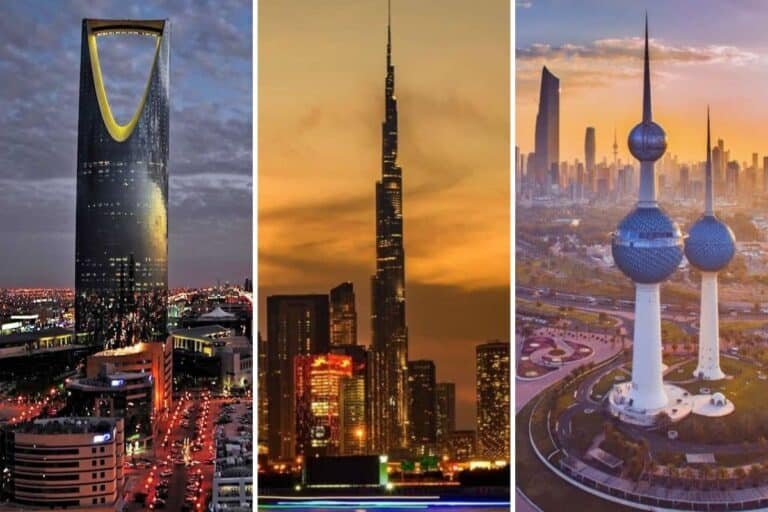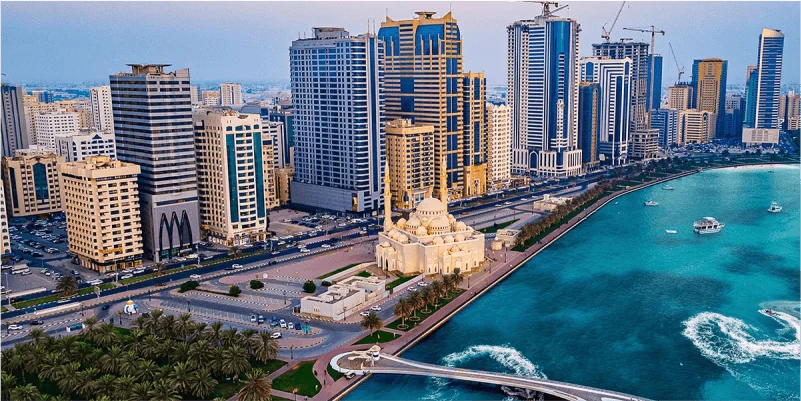Now Reading: UAE Saudi Kuwait Real Estate 2025: What Investors Can Expect
-
01
UAE Saudi Kuwait Real Estate 2025: What Investors Can Expect
UAE Saudi Kuwait Real Estate 2025: What Investors Can Expect

Introduction: UAE Saudi Kuwait Real Estate 2025 Outlook
UAE Saudi Kuwait real estate 2025 is shaping up to be a pivotal year for investors, developers, and residents in the Gulf region. With strong economic fundamentals, government initiatives, and growing demand for premium properties, the real estate markets in these countries are poised for growth and transformation.
As the GCC continues to attract international attention, UAE, Saudi Arabia, and Kuwait are leveraging infrastructure expansion, regulatory reforms, and innovative investment models to make real estate a robust and profitable sector. This article explores the key trends, opportunities, and challenges that will define the region’s real estate landscape in 2025.
UAE Real Estate Performance in 2025
The UAE, particularly Dubai and Abu Dhabi, is expected to continue its upward trajectory in 2025. Key drivers include tourism growth, international investment, and strategic infrastructure projects such as Expo 2020 legacy developments and new urban communities.
Residential demand will remain strong, especially for luxury apartments, waterfront villas, and off-plan properties. Investors are also showing increasing interest in mixed-use developments, offering a combination of commercial and residential spaces in prime locations.
Commercial real estate is expected to expand alongside the growing business environment. Dubai’s position as a global business hub ensures strong demand for office spaces, co-working environments, and retail outlets. Abu Dhabi, with its government-driven economic diversification plans, will witness a rise in premium commercial projects.
Saudi Arabia Real Estate Outlook
Saudi Arabia’s Vision 2030 initiative continues to be a significant driver for the real estate sector. In 2025, residential developments in Riyadh, Jeddah, and emerging cities such as NEOM and the Red Sea Project will attract both domestic and international investors.
Affordable housing remains a priority, with government programs supporting first-time buyers and promoting homeownership. Luxury residential projects are also expected to see growth, particularly in urban centers with high demand from expatriates and investors.
The commercial sector is gaining momentum as Saudi Arabia diversifies its economy. Office spaces, retail hubs, and mixed-use developments are expected to increase in both scale and sophistication. Tourism-driven hospitality real estate is another segment that will benefit from government initiatives aimed at boosting international visitors.
Kuwait Real Estate Forecast
Kuwait’s real estate market in 2025 will benefit from stable economic growth and ongoing infrastructure investment. Residential projects are expected to cater to the growing population, with high demand for apartments, townhouses, and waterfront villas.
Commercial real estate will see a cautious but steady rise, with a focus on high-quality office spaces and retail developments. Kuwait’s central location and business-friendly environment will continue to attract regional investors looking for diversification opportunities.
Government-led initiatives aimed at urban renewal, affordable housing, and infrastructure development will play a pivotal role in shaping the market. These efforts ensure that Kuwait’s real estate remains resilient and attractive to both domestic and international stakeholders.
Key Trends Driving the 2025 Real Estate Market
Several trends are set to define UAE, Saudi Arabia, and Kuwait real estate in 2025:
- Sustainability and Green Buildings – Eco-friendly developments are becoming standard, with energy-efficient systems, sustainable materials, and green certifications influencing buyer preferences.
- Smart Homes and Technology Integration – Automation, IoT devices, and digital property management solutions are increasingly integrated into residential and commercial spaces.
- Fractional Ownership and Investment Platforms – Innovative models, including fractional real estate ownership, are making investment more accessible to a broader range of investors.
- Mixed-Use Developments – Combining residential, commercial, and leisure spaces is a growing trend, offering convenience, lifestyle, and investment potential.
- Tourism-Driven Projects – With tourism recovery post-pandemic, hospitality, and resort properties in UAE and Saudi Arabia will remain highly sought after.
Investment Opportunities Across the GCC
Investors in 2025 will find multiple opportunities across UAE, Saudi Arabia, and Kuwait. In the UAE, high-end residential projects, waterfront villas, and luxury apartments continue to attract both domestic and foreign buyers.
Saudi Arabia offers opportunities in affordable housing, mixed-use urban developments, and tourism-related hospitality real estate. In Kuwait, prime residential units and central business district commercial properties are expected to deliver consistent returns.
Additionally, regional integration, such as the Gulf Cooperation Council’s economic initiatives, facilitates cross-border investment, making it easier for investors to diversify portfolios across multiple markets.
Challenges and Considerations
Despite the positive outlook, real estate investors must navigate challenges such as regulatory changes, market competition, and economic fluctuations. Currency stability, interest rates, and government policies can influence both residential and commercial sectors.
Supply and demand dynamics vary between cities and property types. Investors must carefully evaluate location, project quality, and market timing to maximize returns. Sustainability standards and smart technology integration are also becoming essential for long-term value.
Government Initiatives Driving Growth
Government policies in the GCC are pivotal in shaping the real estate landscape. In the UAE, initiatives to boost foreign investment, streamline property ownership, and enhance infrastructure create an environment conducive to growth.
Saudi Arabia’s Vision 2030 drives large-scale urban projects, tourism expansion, and housing initiatives. Kuwait is focusing on urban development, affordable housing, and improving the quality of life for citizens. Collectively, these programs ensure that the real estate market remains vibrant, resilient, and investment-friendly in 2025.
Market Segmentation: Residential vs. Commercial
Residential real estate in 2025 will see continued demand for luxury and mid-tier homes, with an emphasis on modern design, amenities, and smart technology integration. Expatriates and high-net-worth individuals remain key drivers of demand in urban hubs.
Commercial real estate will grow in line with economic diversification. Office spaces, retail hubs, and co-working environments will cater to evolving business needs, while industrial real estate benefits from logistics expansion and e-commerce growth.
The Role of Innovation and Technology
Technology will play an increasingly important role in shaping real estate markets. Digital platforms, virtual property tours, AI-driven market analysis, and blockchain-based property transactions are changing the way investors, buyers, and developers operate.
Smart cities, integrated urban planning, and energy-efficient buildings are expected to enhance property value and attract forward-looking investors. UAE, Saudi Arabia, and Kuwait are at the forefront of adopting these technologies to improve efficiency and investor confidence.
Economic Drivers for Real Estate in 2025
Strong GDP growth, increased foreign direct investment, and infrastructure projects are major drivers for real estate performance in the GCC. Tourism recovery, oil price stability, and government-led diversification programs enhance economic resilience.
The combination of population growth, urbanization, and lifestyle aspirations ensures that demand for residential and commercial properties remains robust, creating sustainable investment opportunities.
Regional Comparisons and Insights
While all three markets offer growth potential, differences exist:
- UAE: Highly developed, luxury-focused, strong international investment, prime urban and waterfront locations.
- Saudi Arabia: Expanding urban centers, affordable housing focus, tourism-driven developments, large-scale government projects.
- Kuwait: Stable growth, infrastructure development, prime urban residential and commercial opportunities, cautious but consistent market.
Understanding these nuances is essential for investors seeking to diversify across the GCC.
Predictions for Market Performance
Analysts predict positive growth in real estate across the three countries in 2025. Residential sectors in UAE and Saudi Arabia will see steady appreciation, while commercial properties are expected to benefit from economic expansion.
Kuwait will experience moderate but stable growth, driven by urban development and limited supply in prime locations. Investors can expect strong returns from luxury properties, mixed-use developments, and tourism-related real estate.
Opportunities for International Investors
International investors will find the GCC real estate markets attractive due to transparency, high returns, and favorable government policies. Fractional ownership, REITs, and co-investment models make market entry easier, especially in the UAE.
The combination of innovation, urban planning, and lifestyle-oriented developments provides a compelling proposition for global buyers seeking both capital appreciation and rental income.
Long-Term Outlook Beyond 2025
The outlook for UAE, Saudi Arabia, and Kuwait real estate extends beyond 2025, with sustained growth expected as governments continue to implement diversification strategies, smart city initiatives, and tourism-driven development.
Technology adoption, fractional ownership, and sustainable design will continue to reshape the market, ensuring that the GCC remains a premier destination for property investment.
Conclusion: UAE Saudi Kuwait Real Estate 2025 Poised for Growth
UAE Saudi Kuwait real estate 2025 promises an exciting year for investors, developers, and residents. With strong government support, innovative investment models, and growing demand for residential and commercial properties, the market is set to thrive.
By understanding regional trends, leveraging technology, and aligning with market dynamics, investors can capitalize on opportunities across all three countries. The GCC real estate sector in 2025 represents not only financial potential but also innovation, sustainability, and lifestyle-driven growth, making it one of the most attractive investment landscapes globally.
Follow us on: Instagram
Read More-How Technology is Powerfully Transforming UAE Rental Yards in 2025






















